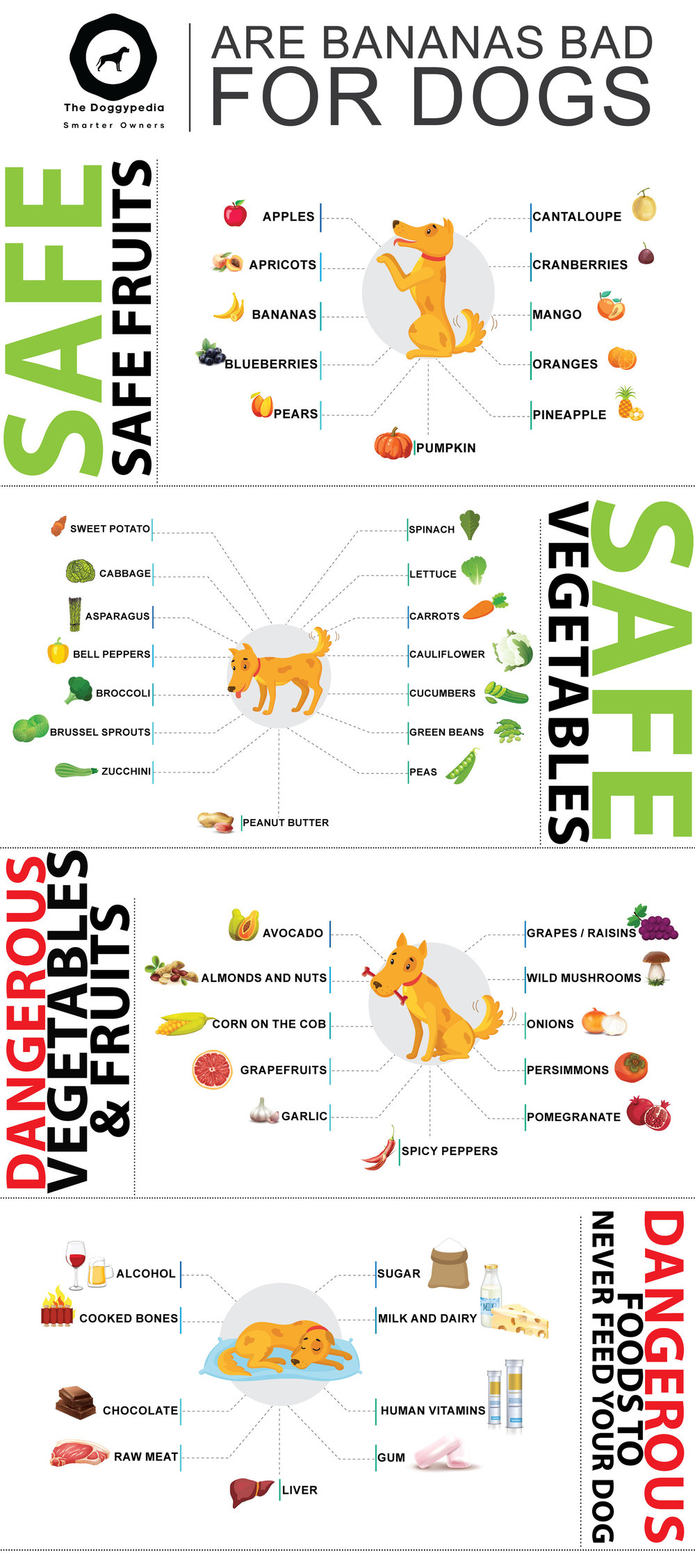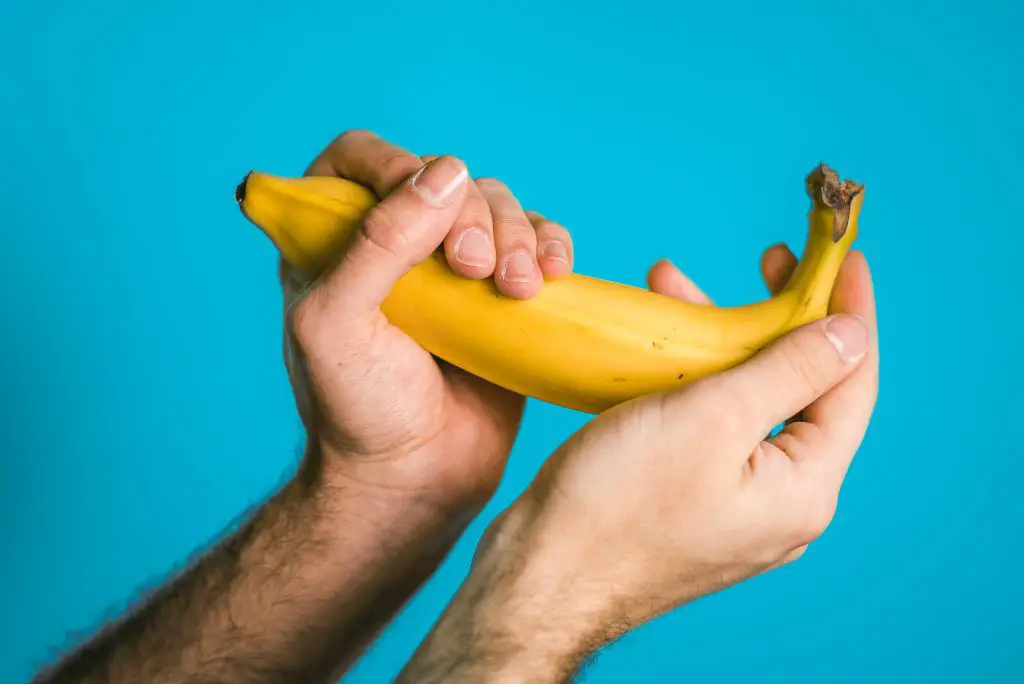
Fruits and vegetables are delicious and are loaded with vitamins and minerals! But your dog’s body isn’t the same as our body. Many fruits and vegetables are safe for us, but not safe for your dog!
If you are ever not sure about feeding your dog a certain food, it’s better to play it safe and not do it.
This list below can be a great guide to help you navigate what’s safe and not safe for your dog to eat!
Can dogs eat bananas? Yes!
Benefits of bananas for dogs
We all know how amazing bananas are in a healthy diet for humans. And it’s exciting to know that some fruits and vegetables are also great for our dogs too.
As long as your dog likes the taste, there’s no reason not to feed your dog a little banana!
Bananas are delicious, and they are healthy for our dogs (in moderation).
Bananas are a fantastic source of potassium, vitamin B6, vitamin C, fiber, and magnesium.
The potassium helps promote healthy heart and kidney functions. The fiber from the banana can help with your dog’s digestion. And the magnesium helps promote healthy bone growth!
Risks associated with banana consumption
Like most fruits, bananas have a lot of sugar. The fiber in the banana will help slow down the sugar absorption, but it’s still good to serve bananas in moderation to your dog.
Like with any food, check to see how your dog responds to eating bananas. Watch out for allergies, weight gain, or any discomfort from your dog.
And like anything, there’s always a chance your dog won’t like the taste of bananas! (hey, you never know!)
Can dogs eat banana peels?
Don’t feed your dog the banana peel. Although it’s not toxic, bananas are often sprayed, and the pesticides can damage your dog’s digestive and immune system.
And the banana peels are difficult to digest.
A peeled banana may already be too much fiber for your dog, so when you add the banana peel, it’s possible that may cause blockages or an upset stomach.
So don’t feed your dog banana peels, and this may save you a trip to the vet.
Portion size?
A banana for your dog should be a treat, not a meal!
It’s possible that eating too many bananas, or even a whole one, can lead to constipation.
So slice them up, and give your dog small pieces. Just like you would with any healthy treat!
How to feed bananas to your dog
One of my favorite ways to feed my dogs bananas are sliced up frozen pieces!
It’s a cool, refreshing treat, especially after a long walk.
Or you can also simply peel the banana and feed it to your dog! I also like to mash up banana and mix it in with the dog food.
And sometimes I even put a little peanut butter on the banana for a delicious treat!
And if you are not sure if your dog can eat peanut butter or other fruits and vegetables, you will love the rest of this article!
Why should you feed your dog fruits and vegetables?
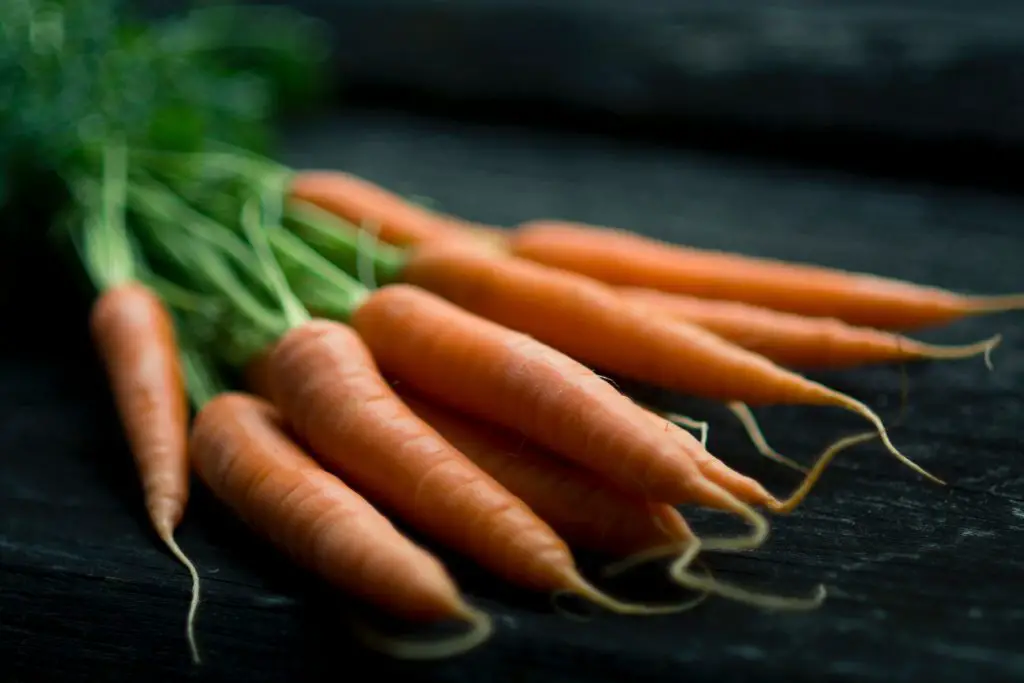
Great Addition To Diet
Fruits and vegetables are often a great safe alternative to commercial dog treats. Commercial treats are often higher in calories than a small portion of fruits and veggies, which can help provide your dog with plenty of natural vitamins and minerals.
But even though they are safe, fruits and vegetables should always be a snack or treat, not your dog’s meal.
Whenever possible, we recommend buying organic. The pesticides sprayed on fruits and vegetables can damage the bacteria inside your dog’s digestive system.
How Many To Feed?
Organic fruits and vegetables are great treats when you are trying to help your dog lose weight, but some of the fruits have a lot of sugar, so keep the portion sizes small.
Cooked Or Raw?
Both are great! Raw fruits and veggies are fun for your dog. But remember to cut up the pieces to small bites so your dog doesn’t choke.
Cooked vegetables (steamed, baked, roasted, grilled, dehydrated) are great too when you need to soften the vegetable for your dog.
Dogs will enjoy your cooked and raw vegetables as a treat!
Watch Out For Allergies
After giving your dog new food, it’s good to observe and watch to see how your dog is responding.
Diarrhea, vomiting, ear infections, bloating, discomfort can all be signs that the new food is not working for your dog.
If you see anything severe, like any changes in your dog’s breathing, always call a vet.
Which Fruits And Vegetables Could You Feed Your Dog?
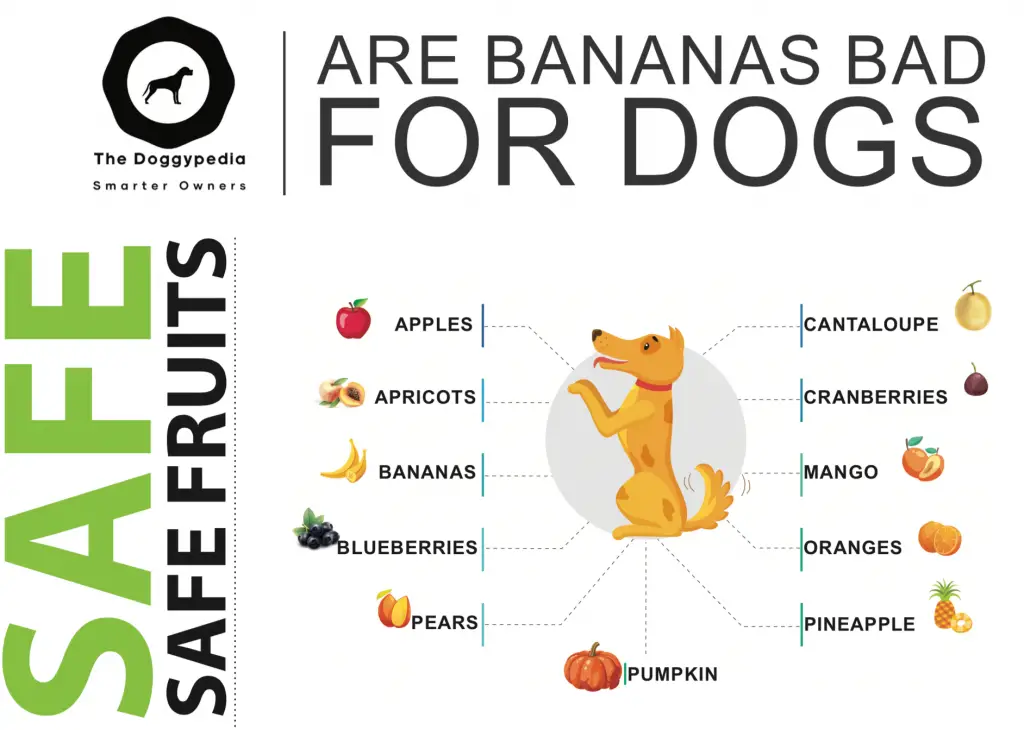
Safe Fruits
All of the fruits below are safe for your dog to eat. But like any fruit, they all contain sugar, and you don’t want to make fruit the centerpiece of your dog’s meal. If your dog likes them, use these fruits below as a healthy treat. The majority of your dog’s calories should always come from meat.
Apples – Can Your Dog Eat Apples?
Yes! An apple a day keeps the doctor away. And the dentist! Apples have natural fibers that will naturally help clean your dog’s teeth, and can act as a natural dental chew.
The vitamin K, calcium, vitamin C, and soluble fiber from the apple will be nutritious for your dog. Apples are a great snack for overweight or older dogs that may have a slower metabolism.
But even though apples are safe, there are a few important things to keep in mind.
The core of the apple and the seeds could be dangerous for your dog. And dogs often can’t control themselves with food, so sometimes they end up eating it all, including some of the toxins in the core and seed. The cyanide in the apple core and seeds is actually bad for us to eat too.
Apricot – Can Your Dog Eat Apricots?
Yes! But be careful again!
Apricots are high in potassium, beta-carotene and vitamin C, so they are nutritious for your dogs. The vitamins and minerals in apricots are anti-inflammatory and can help fight against cancer.
But like apples, with apricots, you want to make sure your dog doesn’t eat the stem, pit, or leaves. They can all be toxic for your dog.
Blueberries – Can Your Dog Eat Blueberries?
Definitely! Blueberries are very nutritious, and are actually ingredients in a lot of the best commercial dog treats. Fresh blueberries have Vitamins A, B, C, E, and K, as well as cancer fighting antioxidants. They are very healthy and can improve your dog’s vision and help prevent cell and tissue damage.
Blueberries can also boost your dog’s immune system to help prevent against urinary tract infections.
But while blueberries have less sugar than most fruits, it still has a lot of fiber, which could upset your dog’s stomach if too many are eaten. So give your dog a few blueberries. Mix them in with your dog’s food. But don’t give your dog a whole carton of blueberries to eat as a meal.
Cantaloupe – Can Your Dog Eat Cantaloupe?
Yes! Cantaloupe is another fruit that is high in vitamins and minerals for your dog. Cantaloupe is a great source of Vitamin A, B, and C and has a lot of anti-inflammatory properties for your dog.
With melons like cantaloupe, it’s important to remove the skin, to make sure your dog doesn’t eat or lick any pesticides or bacteria from the outside rind. The outside cantaloupe skin is also very chewy and hard to digest for dogs.
So slice up a cantaloupe, and give your dog some delicious melon chunks for a healthy, organic snack!
Cranberries – Can Your Dog Eat Cranberries?
Yes! Cranberries have natural properties that help fight against bladder and urinary tract infections. So they can be very healthy for your dog.
But they are tart!
See if your dog likes eating cranberries. You can try mixing dried or cooked cranberries into the dog food.
Cranberries are a great source of vitamin C, fiber, and manganese.
With cranberries, it’s best to stick with the natural fruit, and avoid the processed versions of cranberry jam and cranberry sauces that have sweeteners and preservatives.
Mango – Can Your Dog Eat Mango?
Yes! Mangoes are delicious and another great treat for your dog.
Just like with some of the other fruits, always peel the mango skin and do not give your dog the mango pit which contains toxic cyanide.
Mangoes have a lot of sugar, so if your dog is diabetic, you will want to keep the portion sizes small or maybe skip mangoes all together.
Oranges – Can Your Dog Eat Oranges?
Yes! Orange you glad your dog can eat oranges! 🙂
Citrus oranges are high in vitamin C, which is great for fighting off disease and boosting the immune system. Oranges may help fight against cancer, and assist your dog in flushing out toxins. Oranges have anti-inflammatory properties.
The white inside part of the orange is ok to eat, but do not give your dog the orange skin, leaves, stem, or seeds because they contain toxins that could be poisonous to your dog.
Oranges contain a lot of sugar, so if your dog is diabetic, only give small portions of the fruit flesh to your dog. Remember, the majority of your dog’s calories should come from meat, not from fruits.
Peanut Butter – Can Your Dog Eat Peanut Butter?
Yes! And it’s because peanuts are legumes, not nuts!
Peanut butter tastes great, and has a lot of great minerals like Vitamin B, E, and Niacin. It’s also loaded with healthy fats which may help with your dog’s heart and brain health.
Peanut butter with small banana slices could be a great snack for your dog. Serve the peanut butter in moderation because it’s high in calories.
When picking a peanut butter, check the ingredients, and try to find a peanut butter that only has organic peanuts. No additional ingredients!
Pears – Can Your Dog Eat Pears?
Yes! Pears are delicious and healthy, and have anti-cancer properties for dogs. They are high in Vitamin A, C, fiber and will be a great treat for you dog!
Make sure you wash the pear skin, and remove the core and seeds before giving your dog pears. The seeds contain cyanide which can be poisonous to your dog.
Pears are high in sugar, so if your dog is diabetic, keep the portion sizes low, and remember that fruits like pears should be a healthy snack, not a complete meal for your dog.
Pineapple – Can Your Dog Eat Pineapple?
Yes! Pineapple is yet another great fruit that you can share with your dog. They are delicious and nutritious. Pineapple’s are full of vitamins and minerals like zinc, folate, vitamin C that will help your dog’s digestion and immune system.
Pineapples are high in sugar, so if your dog is overweight or diabetic, it’s important to only give your dog small quantities. I would give pineapple in moderation to your dog. And keep an eye out for any diarrhea or signs of upset stomach.
The outside of the pineapple could be dangerous, so definitely don’t feed that to your dog. And the inner core should be removed as well for your dog.
Pumpkin – Can Your Dog Eat Pumpkin?
Absolutely yes! A few spoonfuls of canned pumpkin can go a long way for your dog.
Pumpkins are high in Vitamin A and beta-carotene, which is great for your dog’s night vision.
Pumpkin can also be a great natural medicine for your dog since it’s high in fiber and can help with any type of digestive issue like stomach pain or diarrhea.
It’s best to avoid pumpkin pie filling because it’s loaded with sugar and spices. Also avoid raw pumpkin because it’s rough and has a lot of seeds. The best option is organic canned pumpkin.
Safe Veggies For Your Dog
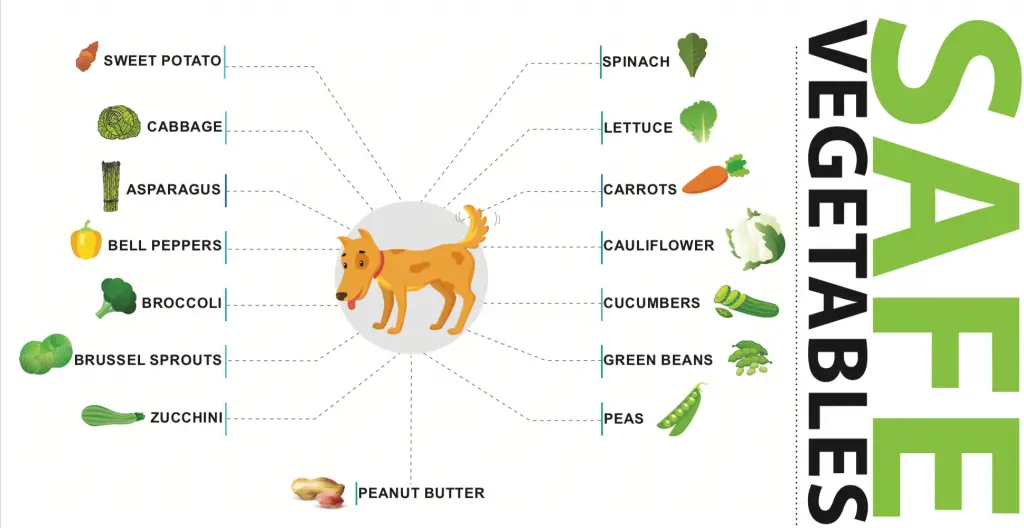
Asparagus – Can Your Dog Eat Asparagus?
Yes! Asparagus is a full of fiber and vitamins that will make it healthy vegetable for your dog.
Since asparagus can be a rough, chewy vegetable, it’s best to give your dog bite sized, cut, slices of cooked asparagus. The cooked asparagus will be healthy and easy for your dog to eat. It’s possible that raw asparagus can give your dog gas, diarrhea and stomach pains.
Bell Peppers – Can Your Dog Eat Bell Peppers?
Yes! And your dog can eat all the colors: red, green, yellow, orange bell peppers in moderation!
Bell peppers are fantastic sources of vitamin C that can boost your dog’s immune system and help fight against cancer and other diseases.
Even though it’s healthy, you only want to give your dog a small amount of bell peppers so it doesn’t upset their stomach.
It’s important to remove the stem from the pepper before feeding your dog.
Broccoli – Can Your Dog Eat Broccoli?
Broccoli is another vegetable that is a human food, but also safe for your dog!
It’s high in vitamin C and fiber, but if you are giving your dog broccoli, only give a small amount to prevent any type of digestive issues.
It’s best to remove the stem of the broccoli before feeding it to your dog.
Brussel Sprouts – Can Your Dog Eat Brussel Sprouts?
Yes! Brussel sprouts are very high in Vitamin C and K and are safe for your dog when fed in moderation.
It’s best to only feed your dog small pieces of cooked brussel sprouts to prevent choking.
Cabbage – Can Your Dog Eat Cabbage?
Yes! Cabbage and other leafy vegetables are very good for your dog.
You can peel the cabbage and sprinkle small amounts into your dog’s food to get it into their diet. All colors of cabbage are fine too, green or purple! Cooked cabbage will be easier for your dog to digest.
You may notice that many commercial dog foods have leafy vegetables in the ingredients, because leafy vegetables are so beneficial to help fight against skin disease, cancer, and digestive problems.
With that said, if your dog looks like it’s in pain, make sure you cut back on the cabbage and vegetable because your dog could be getting gas or possible thyroid gland irritation.
When introducing cabbage to your dog’s diet, it’s best to start with small amounts in moderation.
Carrots – Can Your Dog Eat Carrots?
Yes! Carrots are crunchy, delicious, and a great healthy treat for dogs. Carrots are high in beta-carotene which helps improve your dog’s skin and eye health. Dogs with long hair can also benefit from the nutrients and carrots, which can help keep their coat healthy.
If your dog is small, you may want to slice up the carrot into smaller chunks so she doesn’t choke.
In my house, all of our dogs always snacked on carrots. They are an awesome snack for dogs. You can also cook the carrots if you want it to be softer for your dog. Personally, I like to give dogs a whole carrot so they have a big stick to munch on! It’s like an edible, nutritious chew toy!
Cauliflower – Can Your Dog Eat Cauliflower?
Yes! Cauliflower is high in antioxidants and vitamins and may even help reduce inflammation in dogs with arthritis.
Raw cauliflower might give your dog gas, so it’s best to only serve cooked cauliflower.
Like all the other fruits and vegetables, the fiber in a moderate amount of cauliflower can help your dog’s digestion, but eating too much cauliflower can also hurt your dog’s tummy.
Cucumbers – Can Your Dog Eat Cucumbers?
Yes! And cucumbers are very low in fat and calories, so it’s a good treat for overweight dogs.
The crunchy snack, cucumbers pack a punch of vitamins K, C, and magnesium and help fight against inflammation and even help lower your dog’s blood pressure.
Cucumbers also act as a natural “mouthwash” can help freshen your dog’s breath too!
As always, only serve vegetables in moderation, so a whole cucumber is not recommended.
Green Beans – Can Your Dog Eat Green Beans?
Yes! And green beans are low in calories and a good source of protein, iron, vitamins and minerals and can be a nice treat for dogs on a diet.
If you are serving canned green beans, make sure it’s sodium free.
Lettuce – Can Your Dog Eat Lettuce?
Yes! A great way to mix lettuce into your dog’s food is to steam it, chop it up, and then mix it with dog food. Lettuce has fiber that will aid with digestion and also help your dog feel full.
Leafy vegetables like lettuce are high in Vitamins A, C, and K.
Make sure your dog doesn’t feel gassy or bloated after introducing lettuce into its diet.
Peas – Can Your Dog Eat Peas?
Yes! Frozen peas can be a fun summer treat for your dog.
Peas are loaded with Vitamin A, B, K, potassium, thiamin that can help support healthy bones and immune function in your dog.
Peas can be served frozen, thawed, steamed, or mashed and can be mixed in with dog food.
Serve peas only in moderation because too many can lead to gas and digestive issues.
Spinach – Can Your Dog Eat Spinach?
Yes! Dark leafy greens like spinach are super foods that are bursting with vitamins and minerals.
It will help in your dog’s overall health and immune system. And spinach can also help fight against cancer cells and other diseases.
Because it’s high in fiber, avoid serving spinach in large portions. Only in moderation for your dog.
If your dog has any kidney issues, it’s best to ask your vet or avoid spinach all together because spinach has some soluble oxalates that may be hard for your dog to process.
Sweet Potato – Can Your Dog Eat Sweet Potato?
Yes! And cooked sweet potatoes can be great for your dog’s digestion and overall health.
Sweet potatoes are packed with fiber, water, nutrients that aid in digestion. And they are bursting with vitamins and minerals like thiamine, niacin, and copper.
In moderation, sweet potatoes are a great natural carbohydrate to put into your homemade dog food. If you are wondering, sweet potatoes are more nutritious than white potatoes.
Your dog’s sweet potatoes can be boiled, baked, roasted, dehydrated or plainly cooked without salt. Avoid giving your dog raw sweet potatoes.
Zucchini – Can Your Dog Eat Zucchini?
Yes! Zucchini is safe for your dog in moderation.
High in vitamin C, magnesium, and potassium, if you are a farmer and have too many vegetables this season, feel free to put some zucchini slices in your dog food.
Zucchini can help your dog fight against cancer, heart disease, and infections.
Safe Human Food, But Not Recommended As Highly For Dogs:

Bread – Can Your Dog Eat Bread?
Cooked bread isn’t a food I recommend giving your dog. If your dog accidentally finds your groceries and eats your bread and pastries, don’t worry, it will be ok!
You can use cooked bread as a treat, but just know that the bread doesn’t offer much nutritional value for your dog.
It’s very important to not give your dog any raw dough containing yeast, because the yeast will expand in your dog’s stomach and cause pain and serious problems. Seek a vet immediately if that happens.
Celery – Can Your Dog Eat Celery?
Yes, your dog can eat celery! It’s crunchy and watery and a decent treat for dogs.
It’s possible that eating a lot of celery will also make your dog urinate more because of it’s high water content.
But we don’t recommend celery because of the texture. It’s stringy and it could be messy when your dog eats it. So even though celery is a vegetable that looks good on paper, we don’t recommend celery because it’s difficult to eat for some dogs.
Cheese – Can Your Dog Eat Cheese?
Your dog can eat cheese (and probably will enjoy it because it’s delicious!).
Cheese contains calcium, protein, Vitamin A, and B-complex vitamins. Cheese can be useful when you need to hide a pill and give your dog medication.
But as a whole, we don’t recommend cheese because many dogs are lactose intolerant, and the cheese can cause digestive issues and bloating.
If you want to give your dog cheese, it’s best to go as natural as possible. Grassfed cheeses will be better than grain fed cheeses. And cottage cheese is good because it has a lot of protein.
Hot Dogs – Can Your Dog Eat Hot Dogs?
Dogs love meat. And you want to feed your dog meat.
But the quality of the meat is important too. You want high quality, clean, minimally processed meat. Hot dogs contain so much low quality processed meats and chemicals that we don’t recommend it.
A little hot dog is ok in moderation, but it’s not something you want to give your dog regularly.
Raspberries – Can Your Dog Eat Raspberries?
Raspberries have some good nutrients like Vitamin C that is good for your dog’s immune system. It has anti-inflammatory properties that is great for older dogs with arthritis.
The reasons why we don’t recommend raspberries is because raspberries contain small amounts of xylitol, a natural sweetener.
Xylitol is extremely toxic for dogs. Even small amounts can poison your dog and cause seizures or organ failure. This doesn’t mean your dog will die if it eats raspberries, but we don’t recommend the fruit because of the xylitol.
Blueberries are much safer and better choice than raspberries for your dog.
Strawberries – Can Your Dog Eat Strawberries?
Strawberries (without chocolate or whipped cream!) have plenty of vitamin C, antioxidants, and fiber which is great for your dog and can help whiten their teeth.
But the strawberries stems and leaves can be hazardous, and because of that we don’t recommend strawberries if not prepared correctly.
Strawberries that are well prepared, will be fine in moderation, but blueberries are a safer choice for dogs.
List Of Fruits / Veggies Not To Feed Your Dog!

Avocado
Although they are delicious on toast for humans, it is not recommended to feed your dog avocado.
The most hazardous part of an avocado is the pit. Avocados contain persin, which is a chemical that comes from the avocado pit, and could cause vomiting, diarrhea and heart blockages. And if your dog accidentally goes as far as eating the avocado pit, he can choke.
Some animals have very bad reactions to avocados, thankfully dogs are not as serious, but regardless, call your vet if your dog eats avocado.
Almonds And Nuts
Dogs have a different digestive system than us, and they are not built to handle nuts. Almonds won’t kill your dog, but don’t risk it. Your dog isn’t equipped to digest almonds and other nuts. In fact, macadamia nuts could be very toxic to your dog.
Almonds and nuts can easily cause upset stomachs, diarrhea and vomiting. If you notice any of those symptoms after eating almonds, take your dog to the vet.
You might remember that earlier we said peanut butter is ok for your dog, and that’s because peanuts are not really nuts, they are technically legumes and safer for your dog!
Cherries
Cherry seeds are toxic to dogs. The cherry pit is very easy for your dog to accidentally ingest and can cause digestive obstruction, which will be painful for your dog.
The cherry pit also contains cyanide, which is toxic for your dog. Although your dog won’t be poisoned from one cherry, it’s better to avoid cherries all together.
With that said, seedless cherries are ok for your dog to eat, and will be a good source of antioxidants.
Corn
Corn on the cob is dangerous for your dogs. While your dog will be able to eat corn kernels, feeding an ear of corn to your dog can be hazardous.
If your dog is hungry enough, he will eat the whole corn including the cob! This could lead to choking and cause intestinal blockage. Call your vet immediately if this happens.
Popcorn on the other hand is not recommend as well. Fully popped popcorn is not toxic but it’s very easy for a snacking dog to accidentally eat uncooked popcorn seeds, which will be painful. The ingested seed can lead to digestive pain and dental disease.
If your dog is watching a movie and absolutely needs to eat popcorn, please make sure there’s no butter or condiments on the popcorn. Only serve plain popcorn without any seeds.
In our opinion, there are too many risk associated with popcorn to make it worth feeding to your dog.
Garlic
Onion is one of the most toxic foods your dog can eat. And garlic, (along with scallions and shallots) are in the onion family, so we recommend avoiding garlic completely.
Garlic and foods in the onion family can damage your dog’s red blood cells if it eats enough of them. If enough red blood cells are killed by the garlic, that will cause anemia.
Signs of garlic poisoning are weakness, vomiting, and trouble breathing.
If you are cooking and your dog accidentally eats a garlic, call your vet!
Grapefruits
Although I love the sour taste, our dogs can not eat grapefruits!
The oils and psoralens in grapefruit are toxic for your dog. And if your dog accidentally eats the grapefruit seeds too, that’s double the trouble!
Call a vet immediately, if you notice your dog ate grapefruit and is vomiting, has diarrhea, or you see mood changes.
Grapes / Raisins
It’s unclear why, but some dogs can have develop serious and fatal reactions after eating grapes, while others are unaffected. But in the dogs that are impacted, grapes can cause kidney failure. Even a small amount of grapes.
If your dog’s body is rejecting toxins, your dog will vomit and have diarrhea.
Don’t feed grapes and raisins to your dog. And if your dog eats some, call your vet immediately.
Mushrooms
There are so many different types of mushrooms, that this is a broad category.
For any mushroom that you see in the supermarket or on your pizza, it’s most likely safe for your dog to eat.
But if there are wild mushrooms in a field, you don’t want your dog eating them! Mushrooms can be highly toxic and poisonous for dogs. Some wild mushrooms can cause damage to your dogs liver, kidney, digestion and brain.
If you notice your dog ate mushrooms and doesn’t feel well, call your vet immediately.
Onions
Don’t let your dogs eat onions! It’s one of the most dangerous foods you can feed your dog.
Onions contain disulfides and sulfoxides (thiosulphate) and can damage your dog’s red blood cells and cause anemia.
If you are cooking and your dog accidentally eats a small piece of onion, don’t worry, most likely your dog will be ok.
But you definitely want to keep onions away from your dog and don’t ever put onion in your dog’s food.
Spicy Peppers
Dog’s don’t handle spice as well as humans, and spicy peppers can damage their digestive and cause discomfort. Even if they beg for your spicy peppers, don’t give it to your dog!
Never give your dog hot peppers or jalapeños.
Persimmons
Persimmon seeds have cyanide which are poisonous for your dog, so this is is another fruit that you do not want to give your dog!
Pomegranate
In general, fruits with tons of seeds won’t be good for your dog. And it’s a shame because pomegranate’s are a superfood for humans.
But if your dog eats pomegranate, she might get an upset stomach and the seeds will be bad for her digestive system.
If you really want to feed your dog pomegranate, it’s safer to look for a dog treat that has pomegranate in the ingredients.
What About Other Human Foods Not To Feed Your Dog?
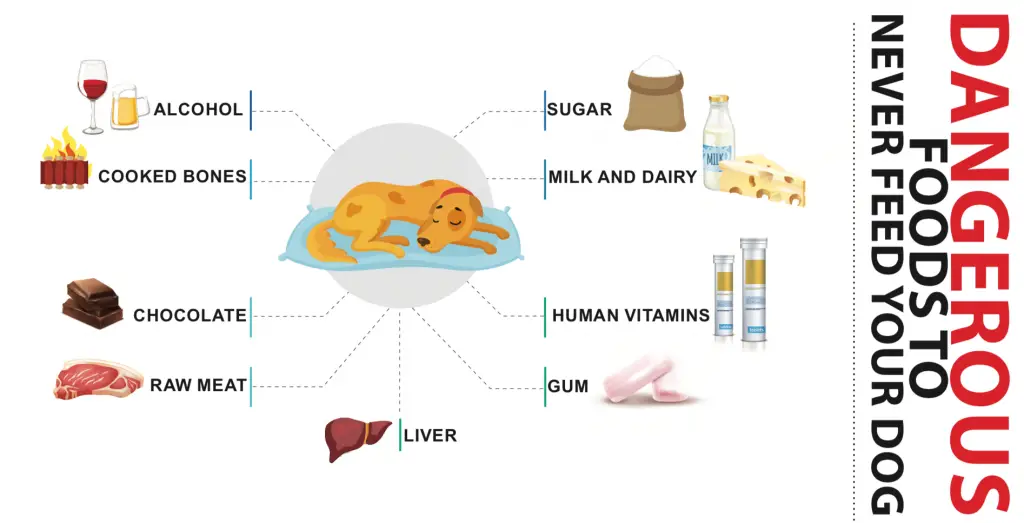
Alcohol / Beer
Did you take your dog to the bar with you?
If you did, don’t let your dog drink beer! Alcohol is toxic to dogs and won’t sit well with her body.
Cooked Bones
If you made soup, and have extra bones, I don’t recommend giving it to your dog. Cooked bones can break off and create painful splinters for your dog.
Raw (uncooked) bones are a much better alternative for your dog to chew on and will actually be good for her teeth.
Chocolate
You probably already know this, but you can not give your dog chocolate! Chocolate contains caffeine and theobromine which are toxic and poisonous to your dog.
The darker the chocolate, the more dangerous it is for your dog to eat.
If you see that your dog just ate a chocolate bar, brownie, or chocolate cookie, call your vet!
Raw Fish
Are you taking your dog to the sushi bar?
Well raw fish has bacteria which can cause food poisoning, so it’s not recommended for your dog.
If you cook the fish, the parasites are killed, and then the fish is safe. Symptoms from eating raw fish could be vomiting, fever and enlarged lymph nodes.
It’s not worth taking the chance, so raw fish is not recommended for your dog.
Gum
If your dog is at a baseball game and wants to chew gum, tell her absolutely not! Gum contains xylitol which is toxic for your dog.
Human Vitamins
Human vitamins are packed with too many vitamins and minerals and could be dangerous for your dog. Especially if the vitamin (like a pre-natal viatmin) has a lot of iron, which will be toxic for your dog.
If your dog ingested a bunch of vitamins, call your vet immediately.
Liver
A tiny bit of cooked liver is ok, but liver could contain too much Vitamin A for your dog, so we don’t recommend it.
Milk And Dairy
Milk can make your dog sick, so we don’t recommend it. If your dog drinks milk once, you might encounter some smelly farts. But in general milk is hard on your dog’s body and shouldn’t be a regular part of her diet.
Sugar
Sugar is in everything, including many of the fruits I listed above. But in general, you don’t want to give your dog too much sugar.
Excessive processed sugar can lead to dental issues, weight gain, and diabetes. When you check your dog treat ingredients, keep an eye out for corn syrup, which is also sugar!
Final Thoughts
- The majority of your dog’s calories should come from meat. Treats and fruits and veggies should be 10% or less of your dog’s diet.
- The pits and seeds from fruits like Apples, Mangoes, Pears, Apricots should not be fed to your dog
- Only serve small, moderate amounts of fruits and veggies to your dog
- Green leafy vegetables (kale, lettuce, cabbage) are good to mix into your dog’s food
- Onions, Garlic, Chocolate are all dangerous for your dog. Call your vet if your dog eats any of those.
- Whenever your dog vomits, has diarrhea, or feels sick after eating a fruit or vegetable, call your vet immediately.
